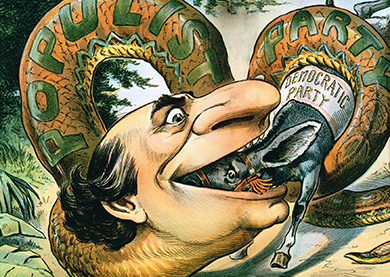| << Chapter < Page | Chapter >> Page > |
In order to bring the plight of Pullman, Illinois, to Americans all around the country, Debs adopted the strike strategy of ordering all American Railroad Union members to refuse to handle any train that had Pullman cars on it. Since virtually every train in the United States operated with Pullman cars, the strike truly brought the transportation industry to its knees. Fearful of his ability to end the economic depression with such a vital piece of the economy at a standstill, President Cleveland turned to his attorney general for the answer. The attorney general proposed a solution: use federal troops to operate the trains under the pretense of protecting the delivery of the U.S. mail that was typically found on all trains. When Debs and the American Railway Union refused to obey the court injunction prohibiting interference with the mail, the troops began operating the trains, and the strike quickly ended. Debs himself was arrested, tried, convicted, and sentenced to six months in prison for disobeying the court injunction. The American Railway Union was destroyed, leaving workers even less empowered than before, and Debs was in prison, contemplating alternatives to a capitalist-based national economy. The Depression of 1893 left the country limping towards the next presidential election with few solutions in sight.
As the final presidential election of the nineteenth century unfolded, all signs pointed to a possible Populist victory. Not only had the ongoing economic depression convinced many Americans—farmers and factory workers alike—of the inability of either major political party to address the situation, but also the Populist Party, since the last election, benefited from four more years of experience and numerous local victories. As they prepared for their convention in St. Louis that summer, the Populists watched with keen interest as the Republicans and Democrats hosted their own conventions.
The Republicans remained steadfast in their defense of a gold-based standard for the American economy, as well as high protective tariffs. They turned to William McKinley, former congressman and current governor of Ohio, as their candidate. At their convention, the Democrats turned to William Jennings Bryan—a congressman from Nebraska. Bryan defended the importance of a silver-based monetary system and urged the government to coin more silver. Furthermore, being from farm country, he was very familiar with the farmers’ plight and saw some merit in the subtreasury system proposal. In short, Bryan could have been the ideal Populist candidate, but the Democrats got to him first. The Populist Party subsequently endorsed Bryan as well, with their party’s nomination three weeks later ( [link] ).


Notification Switch
Would you like to follow the 'U.s. history' conversation and receive update notifications?